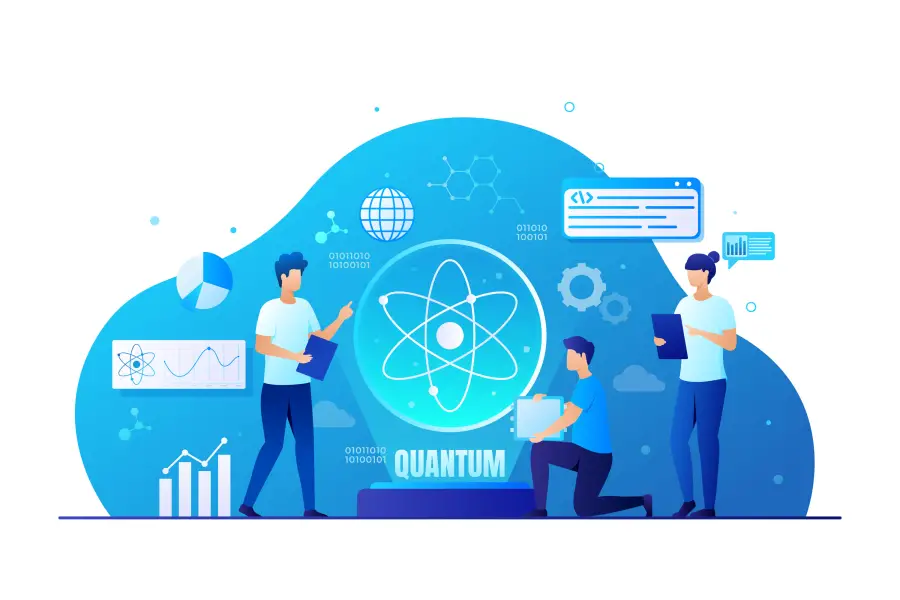Quantum Computing's Secret Weapon: How It's About to Revolutionize AI Forever!
As computing technology progresses exponentially, two fields hold immense potential for revolutionizing the world - quantum computing and artificial intelligence. Quantum computers utilize the principles of quantum mechanics to perform computations exponentially faster than traditional digital computers. Meanwhile, artificial intelligence focuses on developing systems that can perform tasks requiring human-level intelligence, such as visual perception, speech recognition, and decision-making.
While both quantum computing and AI are disruptive in their own right, quantum technology is expected to significantly impact artificial intelligence development. Quantum computers will be able to solve specific problems much faster than classical computers, and this capability can be leveraged to develop more powerful AI systems. In this article, we will examine how quantum computing will likely significantly augment and transform artificial intelligence.
Quantum Computing to Accelerate AI Training
One of the most significant barriers facing today's AI is the computational resources and time required to train models, intense learning models with millions or even billions of parameters. Introducing a single deep learning model can take weeks or months using the largest classical high-performance computing clusters available. This limitation constrains how complex neural networks and AI systems can be designed.
Quantum computing has the potential to significantly speed up AI training processes. Specific quantum algorithms like the Harrow-Hassidim-Lloyd (HHL) algorithm allow efficient linear system solving and matrix inversion - operations that are widely used in machine learning. Quantum machine learning techniques like quantum principal component analysis and quantum support vector machines can solve problems intractable on classical computers analytically.
Research from IBM and Google suggests quantum computers equipped with just 50-100 qubits could outperform today's fastest supercomputers for specific AI tasks. As scaling to larger qubit counts continues, truly exponential speedups may be achieved compared to classical computation. This means neural networks with billions or trillions of parameters could be trained within hours or days rather than weeks or months. The ability to iterate faster on larger models will accelerate advancement across many areas of AI.
Quantum Enhanced Optimization for Deep Learning
Most deep learning models are currently trained using iterative optimization algorithms like stochastic gradient descent (SGD). However, SGD requires many iterations to converge, limiting how complex problems neural networks can tackle. Quantum annealing and other quantum optimization techniques promise faster convergence than classical algorithms.
Quantum annealers from D-Wave already allow efficient sampling of solutions to discrete optimization problems. In the future, hybrid quantum-classical optimization algorithms could help neural networks converge to better minima in complex, non-convex loss landscapes. This will enable deeper architectures addressing more subtle patterns in data. Advances like variational quantum circuits and quantum approximate optimization algorithms also hold promise for training generative models, reinforcement learning agents, and other advanced AI systems.
In general, the ability to explore solution spaces exponentially faster means deep learning will be able to optimize for increasingly difficult objectives that require intricate feature extraction and nonlinear relationships to be discovered from data. Quantum-enhanced optimization may drive breakthroughs like computer vision, natural language processing, and strategic decision-making.
Expansion of Deep Generative Models
Generating synthetic images, videos, audio, and text with high fidelity is an area quantum computing could significantly impact. Deep generative adversarial networks (GANs) already produce impressive synthetic data but require massive datasets, computing power, and parameter tuning to achieve good results.
Quantum machine learning may remedy some of GANs' shortcomings by enabling more expressive generative model architectures to be trained efficiently. Variational quantum circuits allow modeling high-dimensional joint probability distributions, which would be intractable classically. They could generate synthetic datasets spanning multiple modalities simultaneously.
Moreover, quantum Boltzmann machines offer a theoretically efficient approach to unsupervised learning of probability distributions represented by quantum states.
When scaled up, these may produce more realistic synthetic data than today's GANs. Applications include generating medical images for data augmentation, photorealistic computer graphics, personalized avatars, voice assistants, and virtual simulations. Significantly expanded generative modeling capabilities have wide-reaching implications across many industries.
Quantum Enhanced Recommender Systems
Recommender systems leverage past user preferences and behaviors to predict what new items a user might like. They underpin most online personalization, from e-commerce to media streaming. Building and updating recommender models poses significant computational challenges at massive scales involving billions of users and items.
Quantum neural networks based on the HHL algorithm could exponentially speed up matrix factorizations at the core of collaborative filtering recommenders. This would allow larger models incorporating richer contextual metadata to deliver hyper-personalized recommendations matching individual user nuances.
Quantum reinforcement learning techniques also help recommendation engines more intelligently account for dynamic user behaviors over time. By exploring solution spaces faster, quantum algorithms could optimize recommender objectives involving accuracy and diversity more effectively than classical heuristics. Overall, quantum-powered recommender systems may feel clairvoyant in discerning customer preferences.
Quantum Computing for AI Model Analysis
Understanding how complex AI models internally represent patterns and reasoning is essential to ensure trustworthiness, fairness, and interpretability. However, today's tools for analyzing neural network behavior are limited. Quantum machine learning offers promising approaches to lift these constraints.
Techniques like quantum SVM decoding enable efficiently extracting decision boundaries from support vector machines on a quantum computer. This allows for scrutinizing why an ML model classified examples in specific ways. Quantum circuit sampling helps approximate model predictions for out-of-distribution inputs to evaluate robustness.
Similarly, algorithms like quantum Bayesian inference could perform statistical analysis of deep network activations and parameters much faster. This aids in detecting underspecified relationships in data a model has learned, detecting unintended biases, and proposing targeted adjustments to mitigate issues. Overall, quantum computation holds the potential for building rigorous AI assurance technologies that trusted organizations may require for critical deployments.
AI 2.0 Unleashed: The Quantum Revolution Transforming Artificial Intelligence
Artificial intelligence (AI) has made tremendous strides in recent years, from improved machine-learning capabilities to more human-like conversations. However, there are still significant limitations to what AI can achieve with today's classical computers. Quantum computing promises to push the boundaries of AI even further by providing vastly more powerful computational resources.
Conclusion
To summarize, quantum computing will immensely impact artificial intelligence in the coming years by enabling more powerful deep learning algorithms, generative models, optimization techniques, and model analysis approaches at unimaginable scales. When realized at scale, quantum AI may feel akin to artificial general intelligence, with abilities like commonsense reasoning, causal understanding, and seamless interaction often associated with human-level cognition.
Through accelerating training, enhancing optimization, and expanding model architectures, quantum computers promise to substantially improve artificial intelligence's abilities. This will likely drive transformative advances across many domains with implications for how we live, work, and interact with technology in the future. While scaling challenges remain to be solved, continued breakthroughs point to an era of quantum-augmented artificial superintelligence that may arrive sooner than expected.
FAQs
Q1. When will quantum computers be powerful enough to meaningfully impact AI?
A1. Leading quantum hardware companies estimate quantum advantage - where quantum systems outperform classical computers for certain problems - could be achieved within 5 years for specially tailored tasks. However, a meaningful impact on mainstream AI workloads may require 100+ qubit devices available in the mid-2020s. Continued exponential scaling trends suggest 2030 as a tentative goal for broad quantum AI applications. However, timelines still need to be determined based on technology development.
Q2. What types of problems is quantum AI best suited to solve?
A2. Quantum AI is promising for optimization problems using techniques like VQE QAOA. It can also efficiently model complex, high-dimensional distributions as in generative models like QGANs and QBMs. Matrix operations are well-suited, too, via HHL. However, quantum computation may not provide benefits over classical tasks like convolutional neural networks if they require fewer mathematical operations. Engineering problem formulations to leverage quantum resources is important.
Q3. What are the main challenges facing quantum computing development?
A3. Key challenges include scaling to larger qubit counts beyond 100 while maintaining low error rates, developing error correction techniques, ensuring reproducibility of results, developing software compilers and programming frameworks, building specialized algorithms exploiting quantum principles and a lack of error-resistant interconnectivity between specialized quantum and classical processors. Hardware constraints such as qubit lifetimes, control fidelities, and cryogenic requirements continue to slow progress.






Comments (0)